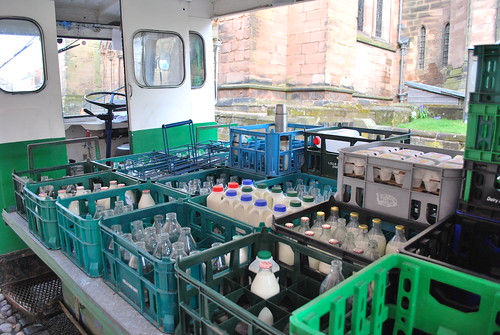
{Photo by rocketlass.}
Nearly a year ago, with the help of Tobias Smollett and Peter Ackroyd, I warned about the perils of drinking milk, which range from dreadful sobriety to painful gout.
Had I recalled it at the time, I could also have drawn on the experienced opinion of Dairyman Crick, who gives Tess Durbeyfield employment as a milker:
She drank a little milk as temporary refreshment--to the surprise--indeed, slight contempt--of Dairyman Crick, to whose mind it had apparently never occurred that milk was good as a beverage.That exchange is followed by a scene of the milking crew in action together. It's rich with details of Victorian country life that I would have passed over inattentively on my first reading of Tess when I was in college, but that I now prize as an example of one of my favorite characteristics of novels--their tendecy to incidentally preserve the living details of lost ways of life. Here the dairyman and his crew run through some folk wisdom:
"Oh, if ye can swaller that, be it so," he said indifferently, while one held up the pail that she spped from. " 'Tis what I hain't touched for years--not I. Rot the stuff; it would lie in my innerds like lead."
"To my thinking," said the dairyman, rising suddenly from a cow he had just finished off, snatching up his three-legged stool in one hand and the pail in the other, and moving on to the next hard-yielder in his vicinity; "to my thinking, the cows don't gie down their milk to-day as usual. Upon my life, if Winker do begin keeping back like this, she'll not be worth going under by midsummer."Ultimately the crew decides to "life up a stave or two" to coax the recalcitrant cows, a practice that remained at least until 1951, when Alan Lomax took his Nagra out to collect folk songs in Scotland and had a milker assure him that her singing "Makes the cow more content, and she gives more milk when she hears me singing."
" 'Tis because there's a new hand come among us," said Jonathan Kail. "I've noticed such things afore."
"To be sure. It may be so. I didn't think o't."
"I've ben told that it goes up into their horns at such times," said a dairymaid.
"Well, as to going up into their horns," replied Dairyman Crick dubiously, as though even witchcraft might be limited by anatomical possibilities, "I couldn't say; I certainly could not. But as nott cow will keep it back as well as the horned one. I don't quite agree to it."
For their part, the cows in Tess seem unbothered by the fact that the song chosen is about "a murderer who was afraid to go to bed in the dark because he saw certain brimstone flames around him." The reader can easily imagine a young Thomas Hardy witnessing such a song and carefully storing it away . . . for the edification of us readers, supermarket milk-buyers all, more than a century later.
But good god, that doesn't mean we should drink the stuff! Why do you think gin was invented?!
It's those details of life that I love about novels, too. I had resolved to go on a Virginia Woolf program but you are seriously tempting me to reread all my Hardy instead (The Mayor of Casterbridge is my favorite); autumn always seems like such a Hardy season anyway.
ReplyDeleteI re-read The Return of the Native last spring and was pleased, and this re-read of Tess has so far revealed an even better novel than I remembered, so I can heartily recommend a Hardy plunge. (Though at the same time, how could you go wrong with Woolf?)
ReplyDeleteAs for memorable details, how about this one, so incidental that even within the novel's narration it comes in parentheses:
"The younger dairymaids, including Tess, breakfasted with their hair loose on Sunday mornings before building it up extra high for attending church, a style they could not adopt when milking with their heads against the cows."